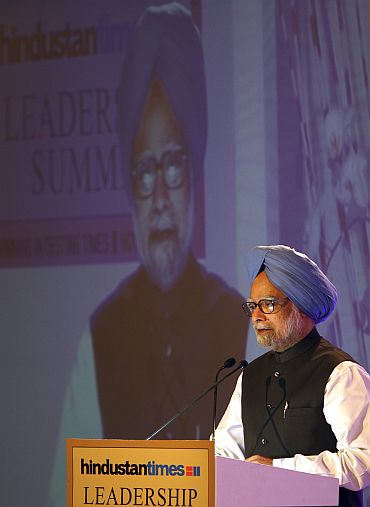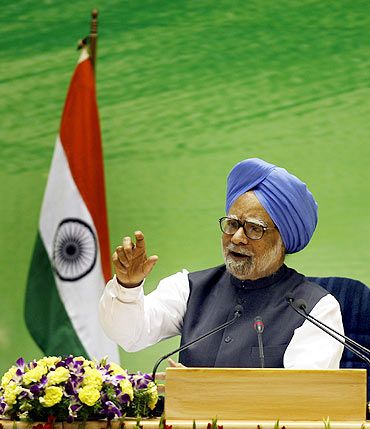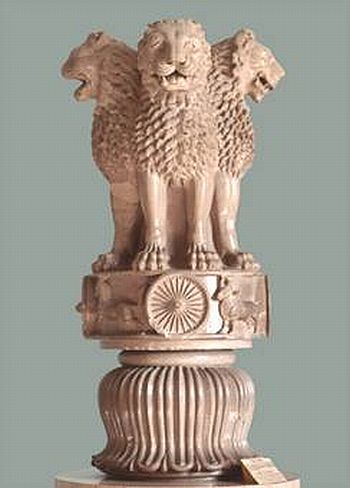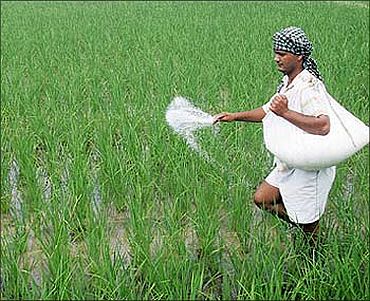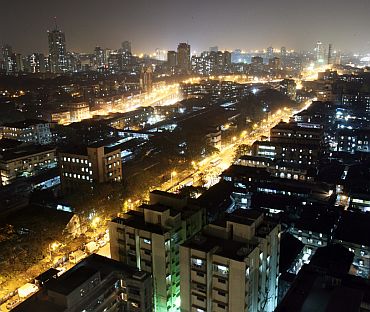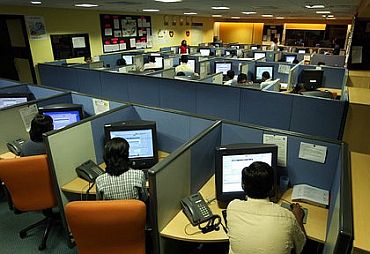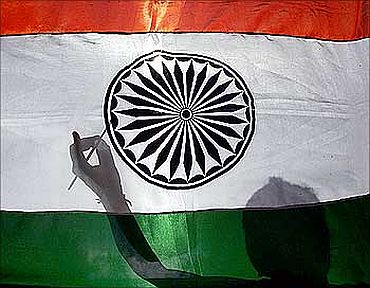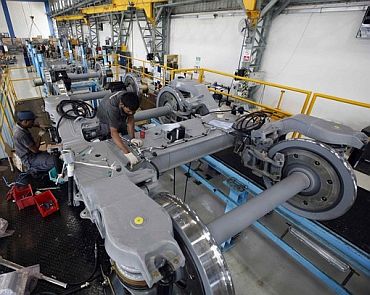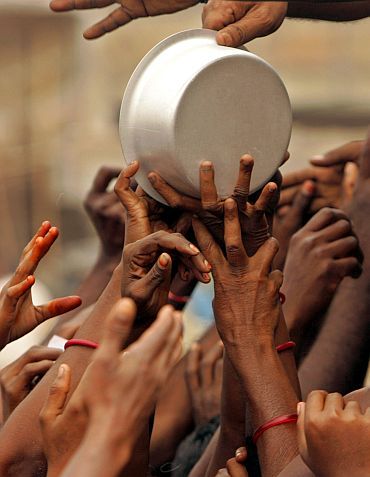 | « Back to article | Print this article |
'As Prime Minister, I sometimes feel like a high school student'
Prime Minister Manmohan Singh on Saturday addressed the Hindustan Times Leadership Summit in New Delhi. His speech:
"It is often said that these are testing times. In fact, I cannot help feeling that we in India are always living through testing times. Indeed, as Prime Minister I sometimes feel like a high school student going from one test to another.
The good news is that despite all difficulties we have to go through and for which we are being tested. We as a nation are winning. Indians are winning. Our children and grand children are winning. Our youngsters are optimistic and their optimism gives me a strong dose of hope. We must be doing at least some things right.
We in India face diverse challenges on many fronts. We live in an era of rising expectations. We live in an era of multiple contestations.
But we are no longer fatalists. We no longer see our destiny as pre-ordained. The youth of today are taking their destiny into their hands and are seeking to shape their future.
Click on NEXT to read further...
'I know what it is like to be a poor in a country as big as ours'
In my childhood, I lived in a village without potable water. Without electricity. Without a school or hospital. But we had faith in our future and that motivated us. We walked miles to go to school.
We studied in the dim light of an oil lamp and I therefore, know what it is like to be a poor in a country as big as ours. Today, the percentage of our population that lives in those conditions is much lower than it was at our independence.
But the absolute numbers are still very large and that is an unacceptable preposition. Millions of our citizens are still deprived and we cannot rest content if that situation is not ameliorating. Every day is a test for million of underprivileged children, men and women in our country.
Yet, India is on the move. The rise of India is the rise of a nation of over a billion people fighting poverty, ignorance and disease, battling social prejudices, living with inadequate infrastructure, dealing with corruption and misgovernance. It is one of the great adventures of our times.
'Through wise leadership we have became a nation united'
This adventure within the framework of a plural, secular democracy is a phenomenon, I sincerely believe, of great historical and global significance. If we succeed as I believe we shall succeed it will have profound consequences for the evolution of humankind in this blessed 21st century of ours.
I am told that in the Chinese language the character for the words "crisis" and "opportunity" happens to be the same. We in India have seen in every problem the opportunity to seek novel solutions. And I salute that spirit of our people.
Consider the very creation of this blessed Republic of India. India was an imagined idea. We were a sub-continent divided at the time of independence. But through hard work, through wise leadership we have became a nation united.
We are a multi-religious, multi-ethnic, multi-lingual country. We made plurality and diversity the essence of our society and polity. We broadened and deepened democracy to be the platform to reconcile differences among various groups of people. We gave the idea of difference itself a positive value.
Today in an increasingly homogenizing world, India is able to challenge stereotypes because differences do not upset us. In fact we thrive in them and we see them as contributing to, and refining the larger national purpose.
'I salute the spirit of the Indian people'
Our freedom movement best illustrates this unique trait of our nationhood. The leaders of our freedom movement led by Mahatma Gandhi devised an entirely new repertoire of weapons like Satyagraha to which even the mightiest had no answers.
After independence, our leadership had to contend with limitation of resources, on the one hand, and the new rising aspirations that had been unleashed, on the other.
We built an industrial structure that put us on a road to self-reliance. When we came to the end of that particular road, and there was a crisis, we grabbed that as an opportunity for the management of change.
Looking back at how we have handled crises in the past I am struck by the brighter side of things. Each time, we have been able to turn a crisis into an opportunity. And I salute the spirit of the Indian people.
An early example of this was the manner in which we used the agrarian crisis of the mid-1960s to launch a 'green revolution' that turned India around. From a nation living from "ship-to-mouth", we became self sufficient in foodgrains.
'Next year we do hope to see growth path of 9-10 pc'
We won in testing times again when we unleashed a new wave of economic growth in the nineties.
The reforms of the nineties did not follow any external recipe. They were home grown and calibrated to suit the Indian situation. Initially, many were skeptical of the changes being initiated. Looking back after two decades, one can see that we did manage to do reasonably well.
We built a strong economy more integrated with the world economy but also able to cope with external shocks and difficulties. This resilience has helped us to negotiate the global meltdown of the last three years fairly well.
I will not say that we have not been affected, but we were among the few countries that recovered quickly from the after affects of global financial crisis. Last year our economy grew at the rate of 7.4%. This fiscal year I am confident that the economy will grow at the rate of 8.5%. And next year, we do hope to return the economy to a sustained growth path of 9 - 10 per cent of GDP.
In celebrating our economic success we must look beyond the success of our large and visible corporate entities.
'Individualism of the Indian is taking this country forward'
We must also salute the spirit of adventure and the spirit of enterprise and the creativity of the small businessman and women, the first generation entrepreneur and the small farmer, each of whom has to deal with a difficult world environment -- often including an unresponsive, inefficient and corrupt government.
It is the individualism of the Indian, the entrepreneurialism of our people, the energy of every student preparing for one test after another and the dreams of our young men and women in our small towns that is taking this country forward and that will take this country moving once again.
A challenge that tests us all the time is that of making our growth process more inclusive; of improving our social and economic infrastructure; of reducing regional imbalances; of increasing the social and economic opportunities for the disadvantage sections, the Scheduled Castes and Scheduled Tribes, Other Backward Classes, our Minorities, Women and Children.
'We must address the new challenges we face'
We are determined to address these problems. Indeed, our effort has been and will be to walk on two legs. To accelerate economic growth, on the one hand, and to make that growth process more socially inclusive, on the other.
We have to work hard to maintain and accelerate growth. We can get to 9-10 percent growth but it will not happen automatically.
We need to invest massively in modernising our infrastructure more and better infrastructure. We need to invest in education and health, in employment-generating industrialization, in more productive and eco-friendly agricultural development.
We must also address the new challenges we face. There is threat to our environment arising from inadequate regulation. We need new thinking to prevent the degradation of our land and water resources, which endanger the livelihood of millions of our people living on the edges of subsistence.
'There is no magic formula. No magic wand'
We need to deal effectively with the threats of corruption and crony capitalism, not only in India but all over the World.
There is no magic formula. No magic wand. No rabbit that can be pulled out of a hat. Nor can we assume that we are that proverbial tortoise that surprised all by overtaking an energetic hare.
You can choose what you like to describe India hare, tortoise, elephant, whatever. The simple truth is that India is a nation of over a billion people eager to realize their destiny.
Our government has a great deal to do to make the future happen.
And what it does must be innovative and must spur innovation.
'Imagination is more important than knowledge'
Our government has dedicated the decade 2010-2020 to be a Decade of Innovation and is putting together a road map for innovation. Albert Einstein once said that in times of challenge "imagination is more important than knowledge".
As times get more challenging, we must leverage our unique advantages to make India a leader in global innovation.
First, the young population that we have is a great potential advantage as the young are by nature innovative. They want to break away from "the dreary desert sand of dead habit". Using those eloquent sentences from Tagore. If we can educate and provide skills to our young population to realize their full human potential, they would innovate through every challenge that we may face.
Second, diversity is considered as another great resource for innovation and India possesses this too as a great advantage.
Third, we are becoming a much more connected society, thanks to the information revolution, the spread of the internet and mobile technologies and this has truly transformational potential in many areas of innovation and it can enable us to leap frog in the race of social and economic development.
'We must invest in the capabilities of our people'
It is on the foundation of a better educated, more healthy and more skilled people that we must build the edifice of a more entrepreneurial society, and leverage our capacity for innovation.
It is our hope that the second decade of this century can be won by us if we invest in the capabilities of our people. It can be won if we invest in education, in health and skills of our people. As a government, our effort should be to create an eco-system of rights to development that empowers our people and enables them to realise their full potential.
To make this happen we also need to put in place a macro economic policy framework, which encourages savings, which ensures fiscal discipline and which supports the spirit of adventure and entrepreneurship, which is so widely prevalent in our country.
The world as a whole is now interconnect as never before.
'Winning the next decade globally means reducing inequalities in the world'
It is integrated now as never before and if your look at the humanity at large its quite clear that the world as a whole cannot win in these testing times unless we act as a responsible global citizens.
Winning the next decade globally means reducing inequalities in the world. It means removing unacceptable poverty and denial of human rights. It means allowing every citizen in the world to maximize his or her human potential.
It also means creating a world that is environmentally sustainable and which we can proudly leave behind for our next generation.
In each of these battles humankind can fight and win together. The greatest battles of our times are not ones in which humans will win over humans, or a nation over a nation.
The greatest tests of our times are ones in which humanity actively together and as a whole will have to fight and win together -- these will be our collective fight against hunger, against poverty, against terrorism, against disease, against tyranny, against corruption, against bigotry and against extremism of all hues.
Such are the testing times such are the tests before us to fight and win. I thank you."
